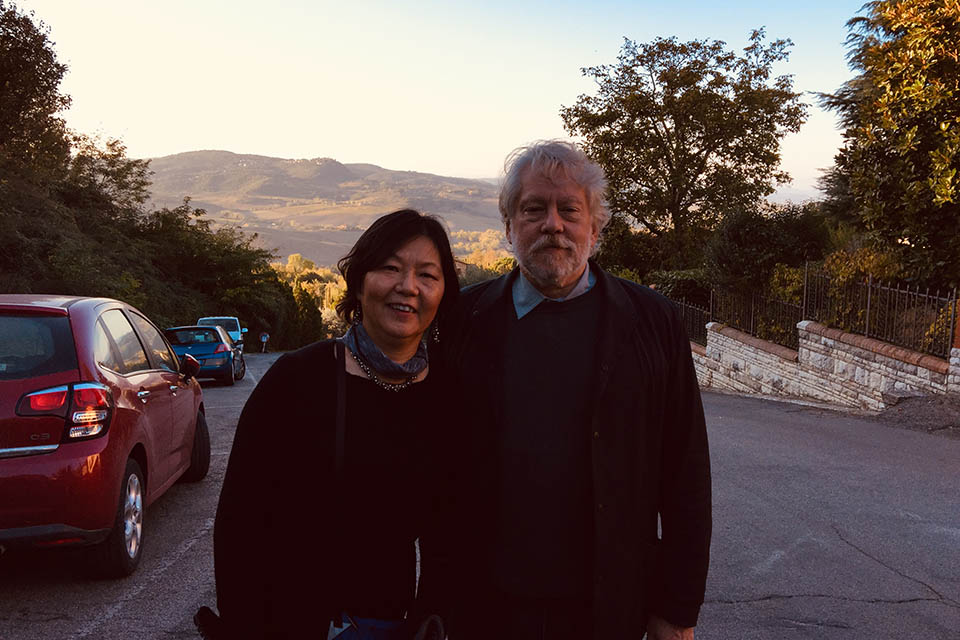Stephen C. Peiper and Zi-Xuan Wang Institute for Vaccine Science and Policy
The Stephen C. Peiper and Zi-Xuan Wang Institute for Vaccine Science and Policy was launched in 2020 following a generous $750,000 investment by Stephen C. Peiper, M.D. (Med ’77), and his wife, Zi-Xuan “Zoe” Wang, Ph.D.
This new center of excellence, led by Daniel Hoft, M.D., Ph.D., sits at the intersection of basic and clinical vaccinology, public health, bioethics, law and diversity, equity and inclusion.
Collaborative Strengths
The institute is composed of multiple collaborative strengths and interdisciplinary faculty from across the university, including faculty from Saint Louis University School of Medicine, College of Arts and Sciences, and the College for Public Health and Social Justice. Building on the strong foundation laid by the Center for Vaccine Development, the institute tackles big questions surrounding vaccinology that cannot typically be addressed by a single academic discipline, from basic/translational vaccine development, to vaccine implementation and equitable uptake.
Led by: Daniel Hoft, M.D., Ph.D.
Professor, Department of Infectious Diseases
As leader of the preclinical, translational, and clinical vaccinology collaborative strength, Hoft connects the preclinical researchers with clinical samples and serves as both a mentor and a facilitator of clinical trials at the Center for Vaccine Development. His expertise and leadership helps investigators move their work to the next stage of vaccine research.
Led by: Richard DiPaolo, Ph.D.
Professor and chairman in the Department of Molecular Microbiology and Immunology
DiPaolo’s research program includes studying the regulation of inflammatory diseases, autoimmunity, and cancer, as well as immune responses to infections and vaccinations. As leader of the institute’s basic immunology collaborative strength, he promotes translational applications of basic vaccine science discoveries.
Led by: Tae Hyuk (Ted) Ahn, Ph.D.
Associate professor, computer science
Ahn is also a core faculty member in the graduate program of bioinformatics and computational biology. As leader of the institute’s computational biology unit, Ahn uses his interdisciplinary expertise in bioinformatics, biomedical informatics, high-performance computing, and various computational sciences, including machine learning and deep learning, to support researchers in developing analytic methods to interpret biological data.
Led by: James Edwards, Ph.D.
Professor, Department of Chemistry
David Ford, Ph.D.
Professor, Department of Biochemistry and Molecular Biology
Edwards is a bioanalytical chemist widely regarded as an expert on the use of mass spectrometry methods for metabolomic research. Ford is a physiological biochemist with a research focus on lipid metabolites as mediators and biomarkers of inflammation. Together, they build system vaccinology at SLU and enable members of the institute to probe scientific questions with multi-platform omic strategies, ultimately informing new treatments and preventative measures.
Led by: Timothy Wiemken, Ph.D.
Adjunct professor, Division of Infectious Diseases, Allergy, and Immunology
Wiemken supports the institute’s researchers in managing and analyzing large datasets. Drawing on his expertise in epidemiology, he also works with faculty members to tackle complex questions regarding vaccines that bridge multiple disciplines within the institute.
Led by: Ricardo Wray, Ph.D.
Professor, Department of Behavioral Science and Health Education
Wray’s research primarily seeks to understand how communication processes intersect with institutional, social, and community-level phenomena affecting population health in minority communities. His leadership at the institute helps shape conceptual approaches and research to explore programmatic and policy questions of interest to the institute.
Led by: Esmeralda Aharon
Program director, School of Medicine
Aharon is the program director of staff and community engagement for the Office of Diversity, Equity, and Inclusion. In this role, she collaborates with hiring managers to attract and retain underrepresented individuals. Aharon helps promote interactions between the institute and the Saint Louis community to develop trusting, long-term relationships with underrepresented populations.
Led by: Jason Eberl, Ph.D.
Professor, Albert Gnaegi Center for Health Care Ethics
Eberl’s research interests pertain to the philosophy of human nature and its application to issues at the margins of life, and ethical issues related to end of-life care, genetics, and health care allocation. As leader of the institute’s bioethics collaborative strength, he applies his expertise to address ethical issues related to vaccine research and development, allocation policies, and public education.
Achievements
Thanks to the generosity of Stephen. C. Peiper and Zi-Xuan Wang, the institute has established collaboration between:
- Jeffery Scherrer, Ph.D., (an outcomes researcher in family and community medicine who was awarded a multi-million award for the NIH-funded All of Us study), Hoft and Christine Jacobs, M.D. This has resulted in five papers reporting evidence that elderly persons who get routine adult vaccinations have lower risks for progression to dementia.
- Hoft and Enbal Shacham, Ph.D., to study vaccine acceptance among underserved populations.
- SLU Taylor Geospatial Institute (T.G.I.)-sponsored panel discussion,including Hoft of the effects of climate change on infectious disease.
Ongoing Projects Made Possible by the Institute
- A project to study vaccine hesitancy in Saint Louis City and County resulting in a report informing the local public health authorities, led by Ricardo Wray.
- A research survey project focused on studies of vaccine hesitancy among pediatric patients; results are still pending on this project.
- The development of a vaccine for respiratory and arthropod-borne viral diseases, led by Brett Jagger, M.D.
- Recruitment for new impactful vaccine researchers at the Center for Vaccine Development.
